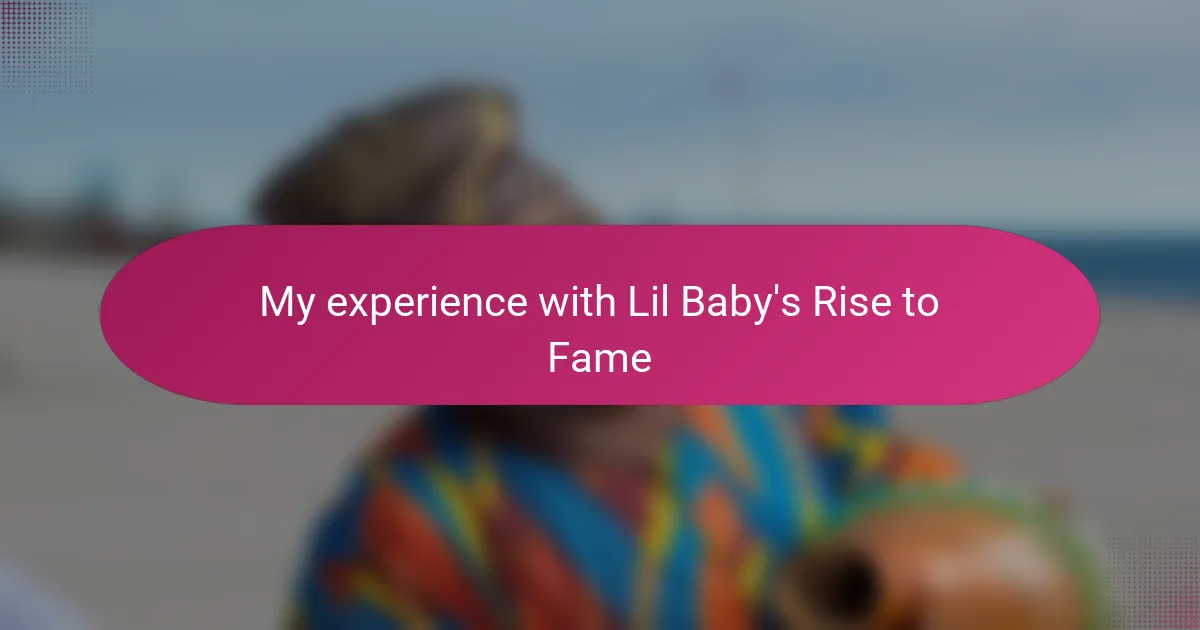Key takeaways
- Lil Baby’s rap style is characterized by an effortless flow, strong lyricism, and adaptability across various musical genres.
- Key moments in his career include the mixtape “Harder Than Ever,” the collaboration on “Drip Harder,” and the impactful album “My Turn,” which cemented his legacy.
- He has reshaped the rap scene by blending commercial success with genuine artistry and promoting emotional transparency in storytelling.
- Lessons from Lil Baby’s journey emphasize the importance of consistency, authenticity, and collaboration in achieving success in the music industry.
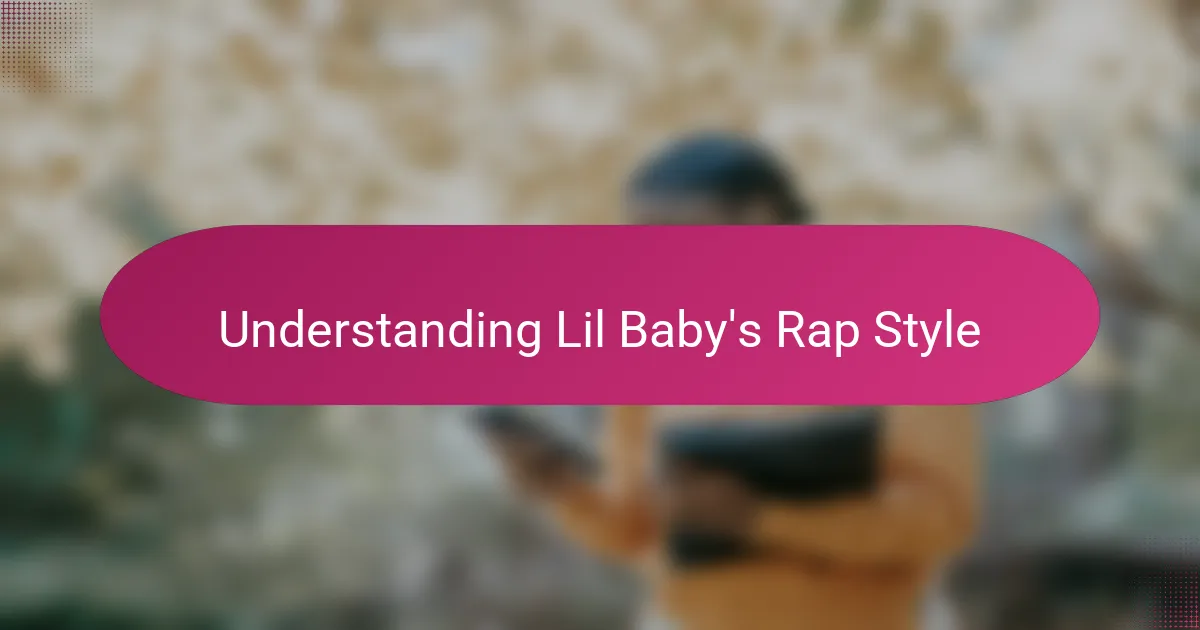
Understanding Lil Baby’s Rap Style
What makes Lil Baby’s rap style stand out to me is his effortless flow that feels both natural and precise. Have you ever noticed how he rides the beat with such confidence, as if the rhythm is an extension of his own voice? That seamless integration is what drew me in early on.
His lyricism is raw, yet delivered with a cool detachment that adds an emotional layer without sounding forced. I remember hearing tracks where his words painted vivid pictures of struggle and triumph, and it felt like he was sharing pieces of his own journey rather than just verses. That authenticity gave his style a depth I rarely found elsewhere.
Another aspect that caught my attention is his adaptability—whether it’s a harder street anthem or a melodic, introspective track, he shifts effortlessly. This versatility keeps me wondering, how does an artist maintain such consistency while constantly evolving? For Lil Baby, it seems like a natural progression rather than a conscious effort, which speaks volumes about his talent.
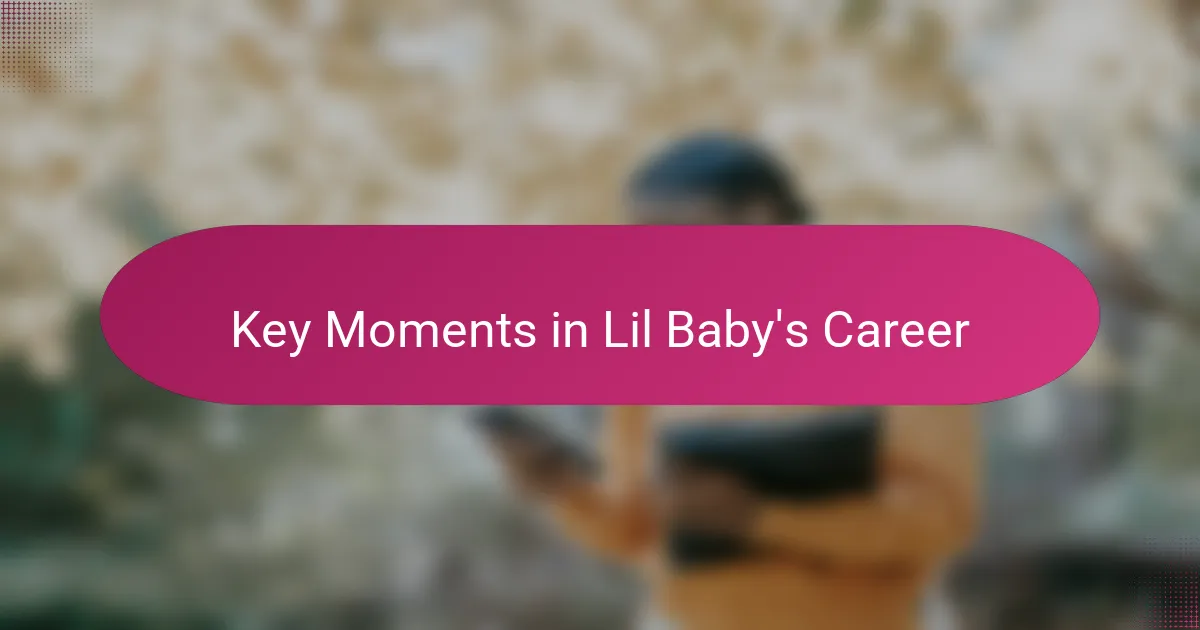
Key Moments in Lil Baby’s Career
One moment that really stands out to me is when Lil Baby dropped his mixtape Harder Than Ever in 2018. I remember the buzz it created—it wasn’t just a new project; it felt like a declaration that he was here to change the game. Songs like “Yes Indeed” with Drake showed me how quickly he could share the spotlight and still shine on his own terms.
Another key chapter has to be his collaboration with Gunna and Young Thug on the Drip Harder project. Listening to it, I felt like I was witnessing a new wave forming right in front of me. Their chemistry was undeniable, and it made me realize how important alliances are in rap, not just for exposure but for pushing creative boundaries.
Then, of course, there was the release of My Turn in 2020, which for me was the moment Lil Baby truly cemented his legacy. The album resonated on so many levels—personal, social, and musical. It made me wonder how an artist can remain so relatable and grounded while skyrocketing to superstardom, and that’s something I’ve often reflected on since.
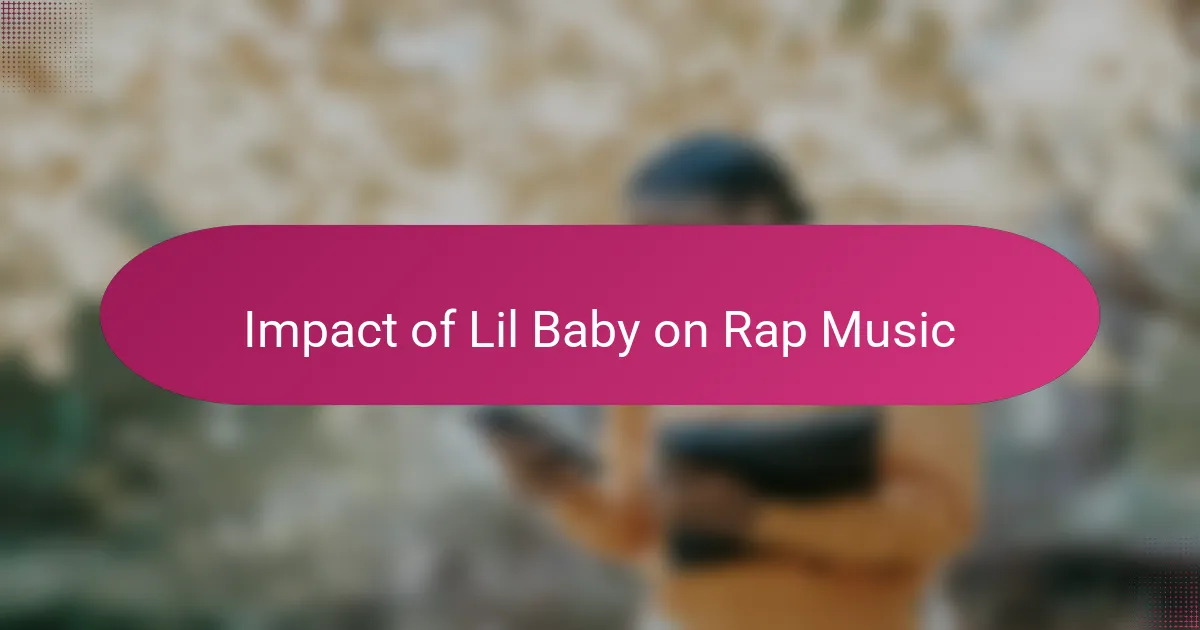
Impact of Lil Baby on Rap Music
Lil Baby’s impact on rap music feels like a breath of fresh air to me. He didn’t just enter the scene—he reshaped it with a style that’s both modern and deeply rooted in the streets. Have you noticed how many rising artists seem to draw inspiration from his flow and storytelling? It’s clear to me that he set a new standard for what authenticity sounds like in today’s rap.
What I find most striking is how Lil Baby blends commercial success with genuine artistry without losing either. His ability to jump effortlessly between club bangers and introspective tracks makes me think about how rare that balance is. It’s not just about making hits; it’s about making music that resonates, and I’ve heard firsthand how his work motivates both fans and fellow rappers alike.
Reflecting on his influence, I also see how Lil Baby has changed the conversation around vulnerability in rap. He’s opened doors for artists to share real emotions and personal struggles without feeling the need to mask them behind bravado. This shift feels important to me because it’s encouraging a new kind of storytelling—honest, relatable, and powerful. Wouldn’t you agree that this emotional transparency is changing rap for the better?
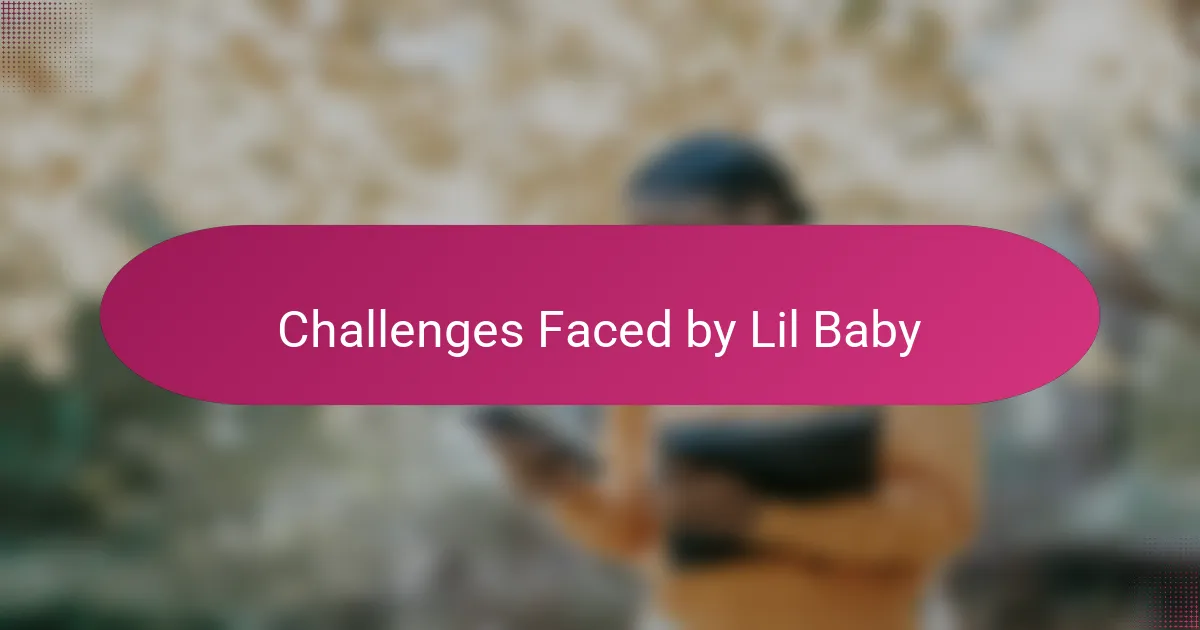
Challenges Faced by Lil Baby
One challenge that really struck me about Lil Baby’s rise is how he navigated a difficult past before the spotlight found him. It’s easy to forget that behind his smooth flow lies a story of overcoming legal troubles and street life, which could have easily derailed his dreams. I often wonder how he maintained that focus and resilience when so many around him lost their way.
I also think about the pressure he must have faced breaking into an already crowded rap scene. From my experience watching artists grow, standing out isn’t just about talent—it’s about finding a unique voice while fighting industry expectations. Lil Baby’s ability to stay true to his raw storytelling amid all those demands shows a kind of strength and clarity that really impressed me.
Then there’s the challenge of balancing rapid fame with personal growth. I’ve seen how sudden success can overwhelm artists, pulling them in different directions both publicly and privately. Lil Baby’s candidness about these struggles adds a layer of authenticity that’s rare, and it makes me respect his journey even more. It begs the question: how does someone stay grounded when the world is watching every move?
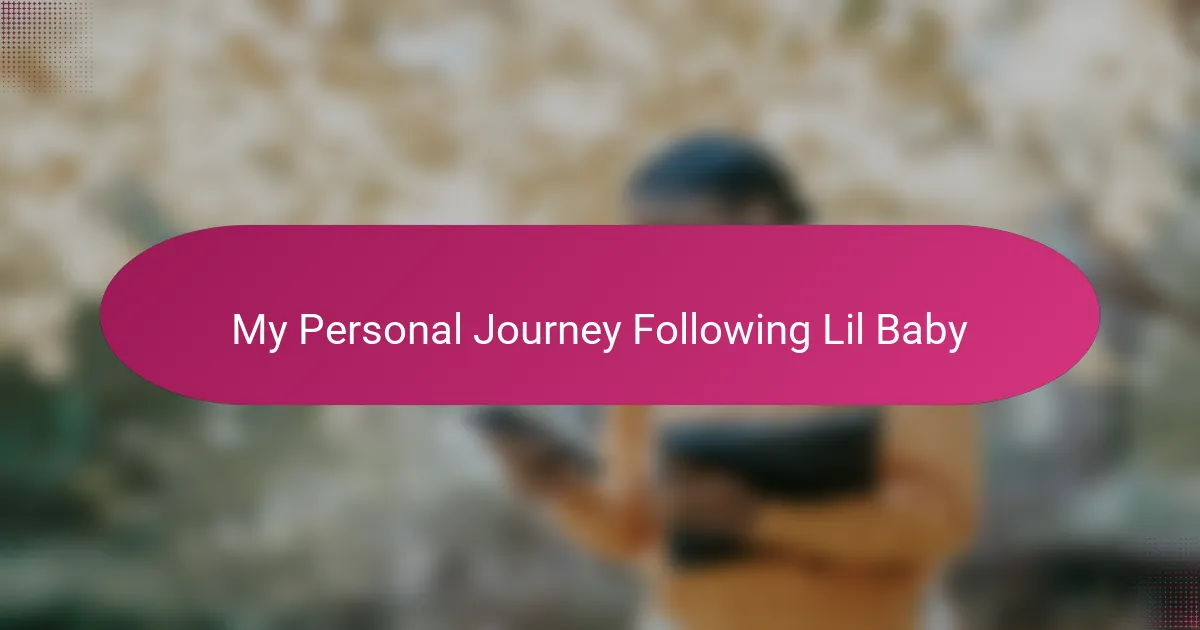
My Personal Journey Following Lil Baby
Following Lil Baby’s rise felt like joining a front-row seat to an artist’s evolution, almost as if I was growing alongside him. I remember the first time I heard one of his tracks blast through my speakers—it wasn’t just music, it felt like a story unfolding that I couldn’t look away from. Have you ever experienced that moment when a song just clicks with you on a deeper level? That’s exactly how it was for me with Lil Baby.
Over time, tracking his journey got me reflecting on my own growth as a fan and a listener. Watching him navigate shifts in style and collaborations made me appreciate the risks he took to stay authentic. It made me wonder: how often do artists really get the chance to reinvent themselves before the pressure of fame weighs them down? Lil Baby’s journey showed me that it’s possible, and that’s inspiring.
There were also moments when his lyrics resonated with me personally—touching on struggles and victories I hadn’t even put into words myself. It felt like he was narrating not just his life but parts of mine too. That connection is rare, and I found myself coming back for more, eager to see how his story would unfold next. Don’t you think that’s the power of real artistry?
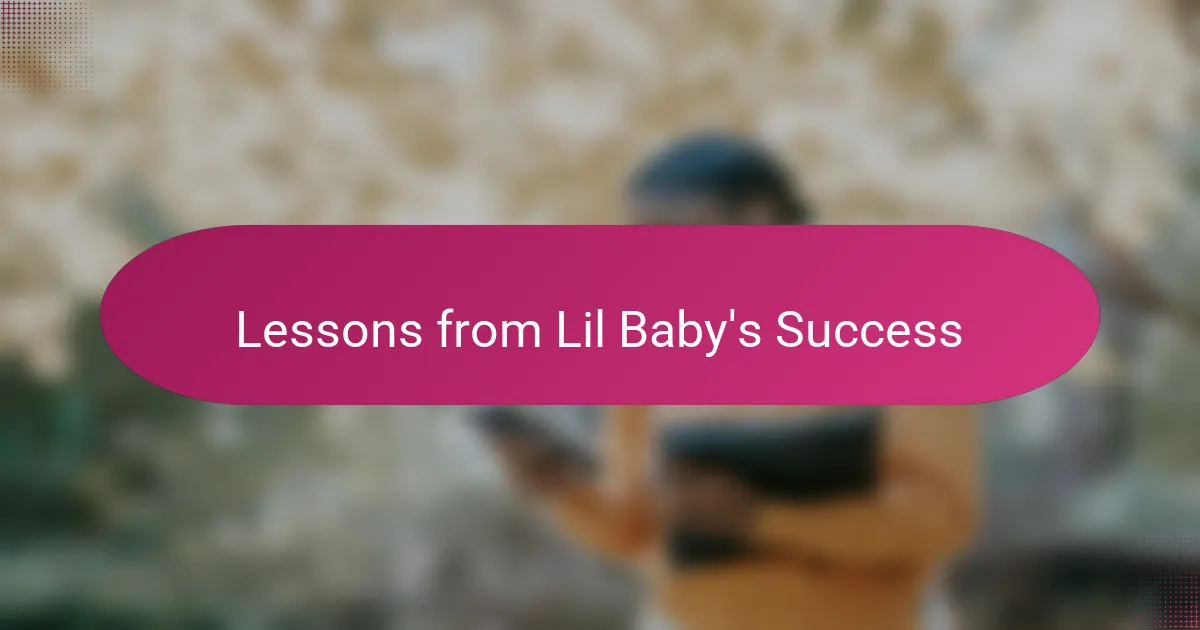
Lessons from Lil Baby’s Success
When I look at Lil Baby’s success, one lesson that really stands out to me is the power of consistency. He didn’t explode overnight—there was a steady grind behind every release. It makes me think: how many artists give up too soon because they don’t see instant results? Lil Baby shows that patience and persistence pay off.
Another thing I’ve learned is the importance of authenticity. Lil Baby’s ability to stay true to his story, no matter how raw or real, connected with so many people—including me. Could it be that fans today crave honesty more than polished perfection? From my experience, embracing your true self creates the strongest bond.
Lastly, his journey teaches me how collaboration can fuel growth. Partnering with others like Gunna and Young Thug wasn’t just about fame; it was about pushing creative boundaries together. Isn’t it fascinating how sharing the spotlight can amplify your own shine? This balance of independence and teamwork is something I think more artists should embrace.
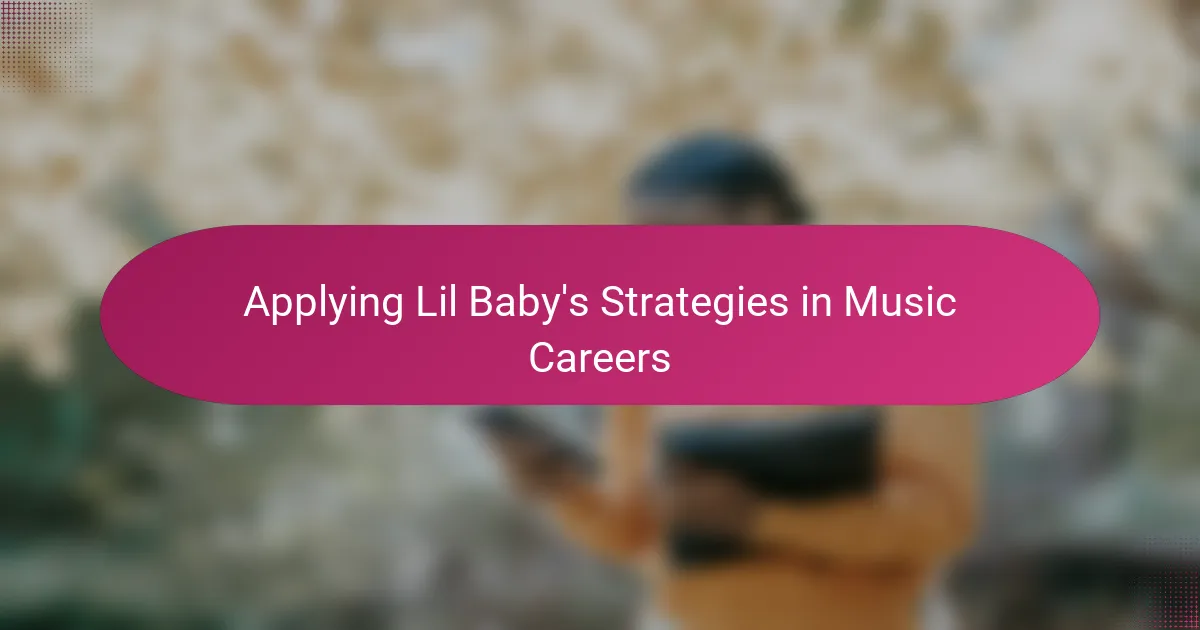
Applying Lil Baby’s Strategies in Music Careers
Applying Lil Baby’s strategies to my own approach in music, I realized just how crucial it is to build a consistent work ethic. Watching him drop projects regularly without losing quality reminded me that success rarely happens overnight. Have you ever been tempted to slow down when results don’t immediately show? Lil Baby’s journey taught me that sticking with your craft, day after day, truly makes a difference.
What struck me as equally important was his commitment to authenticity. Lil Baby’s raw storytelling wasn’t polished to please everyone, yet it resonated deeply with me and countless fans. That made me rethink how much vulnerability I was willing to show in my own music. Is it possible that being perfectly “real” can create a stronger connection than trying to fit a mold? His example convinced me it absolutely can.
Finally, I found inspiration in how Lil Baby leveraged collaboration—not just for exposure, but as a creative partnership. Working closely with artists like Gunna and Young Thug pushed him to new heights, and I’ve since wondered how I could invite more meaningful collaborations into my own career. Have you noticed how combining talents often sparks something unexpected and fresh? That dynamic energy feels like a catalyst for growth, and it’s something I’m keen to explore further.
